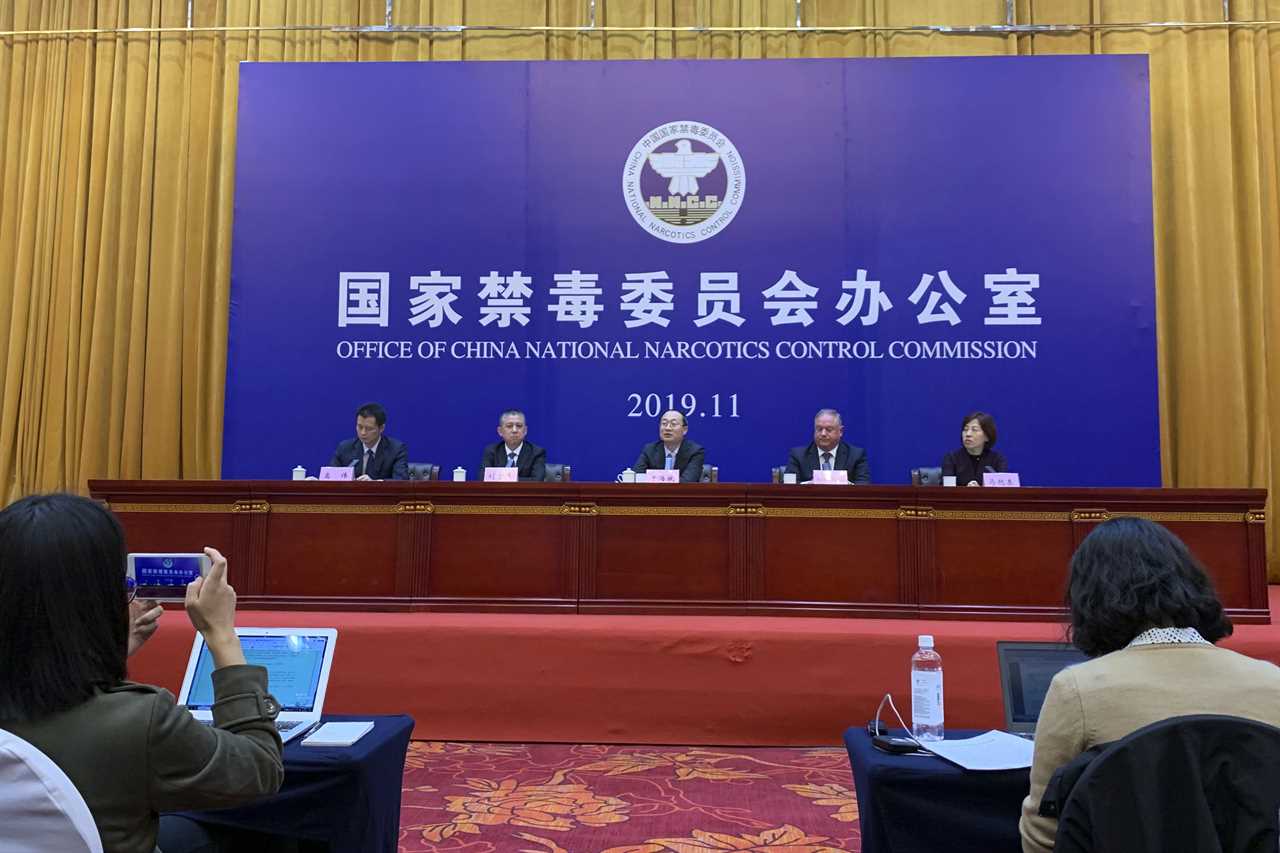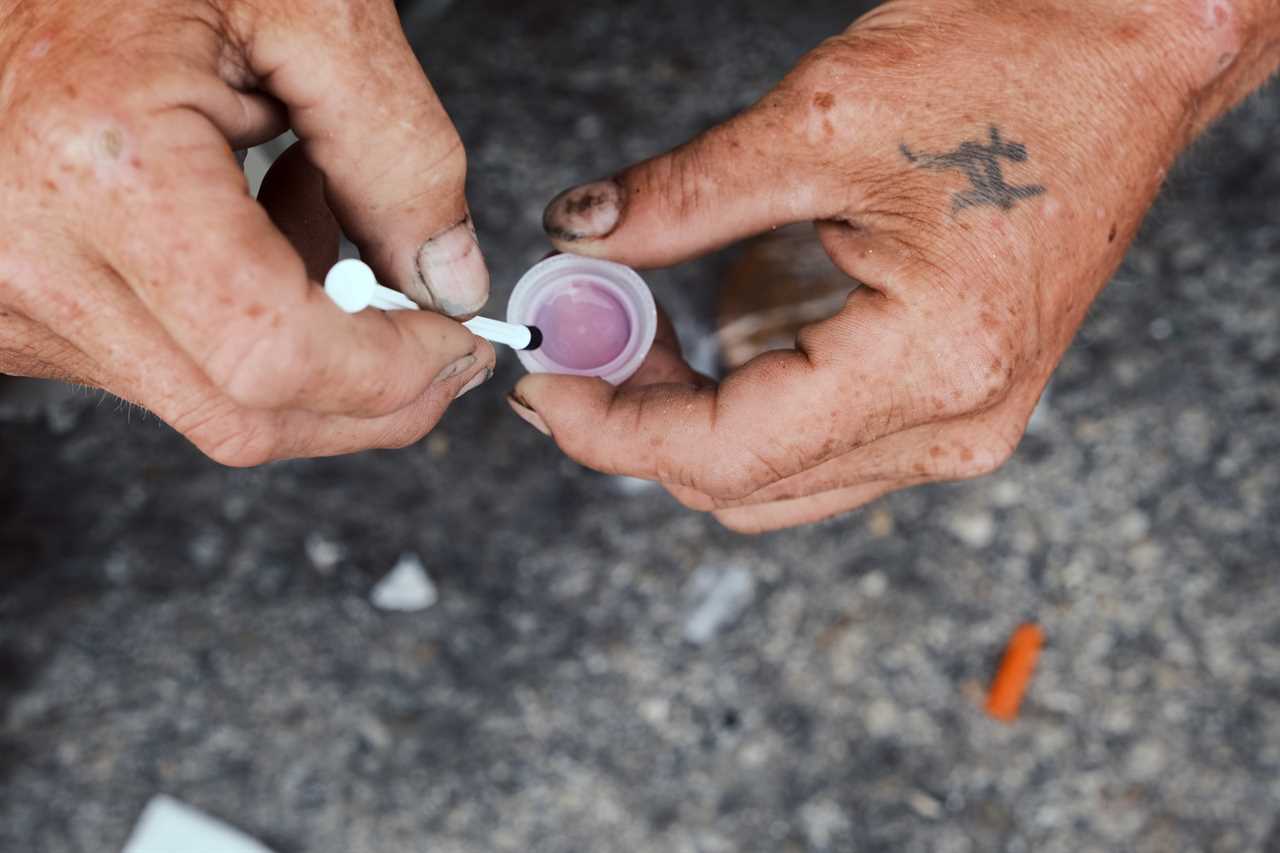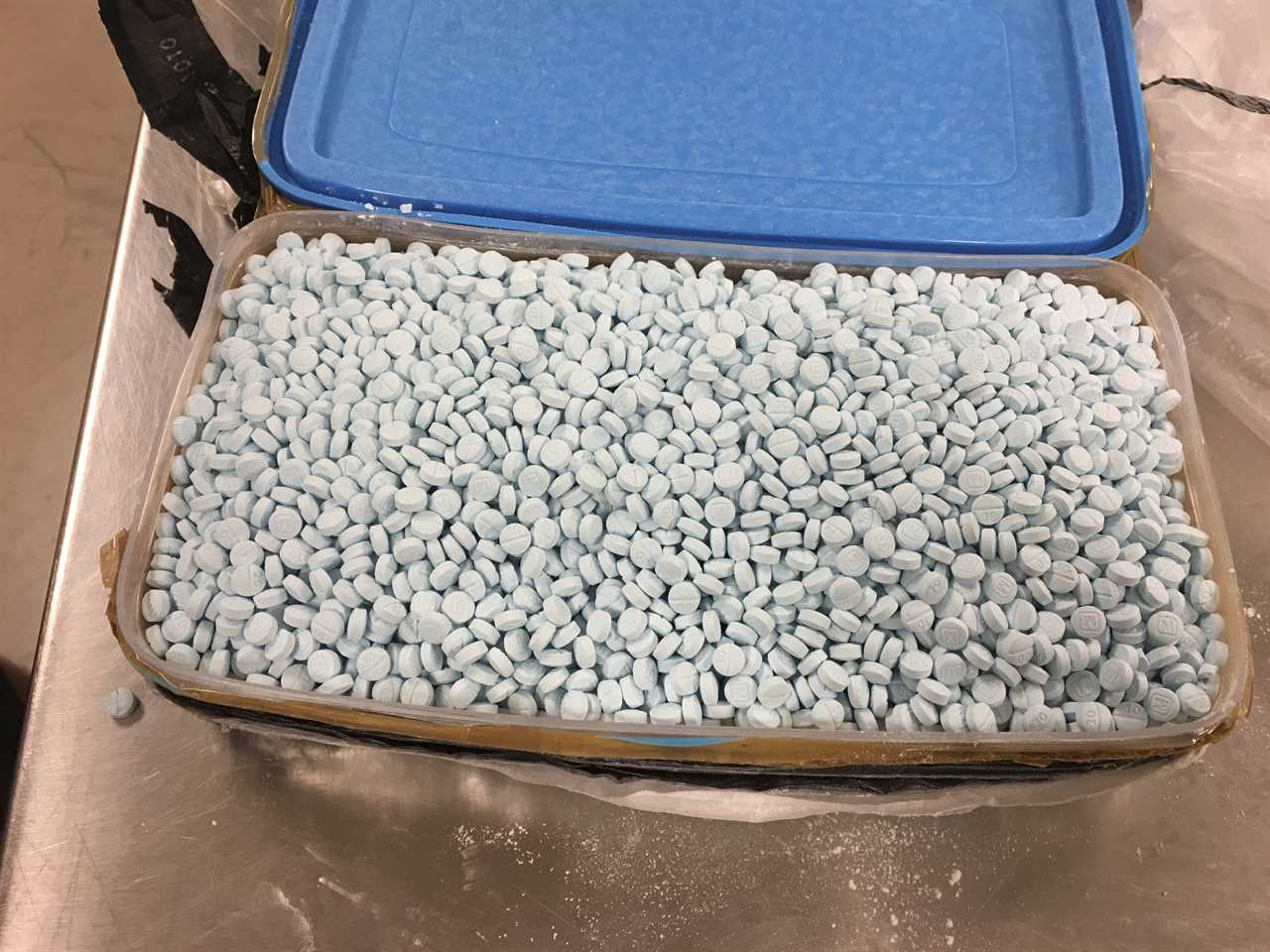
The deadliest issue in the U.S.-China relationship right now isn’t the potential for military conflict over Taiwan, but the thousands of overdose deaths in the U.S. each year from illicit fentanyl made from Chinese raw materials.
China’s reluctance to tighten controls on chemical production and exports has spurred a clash with U.S. legislators, and will be the focus of a long-awaited report this week on its role in fueling the flow of drugs that Mexican cartels process into synthetic opioid fentanyl.
The report from the Commission on Combating Synthetic Opioid Trafficking, to be released Tuesday, must also contend with Beijing’s politicizing of counternarcotics cooperation, which has stymied efforts to reduce the supply of fentanyl and related chemicals flooding U.S. streets.
Fentanyl, a drug approved for pain treatment, killed more than 64,000 Americans from April 2020-April 2021, according to the Centers for Disease Control and Prevention. A recent Stanford-Lancet study warned that the U.S. opioid overdose death toll could rise to 1.2 million by 2029.
Those grim numbers have politicians fuming.
“China’s critically involved in the 64,000 deaths we had because they are pretty much the lone supplier of [fentanyl] precursor chemicals and pre-precursor chemicals, which they are shipping to Mexico,” said Rep. David Trone (D-Md.), the commission’s co-chair.
“They know it’s being shipped to Mexico, it’s being done by Chinese middlemen who are selling it directly to the Mexican cartels where it is being turned into fentanyl, which is then being mixed into other drugs like counterfeit pills [including] Oxycontin, Xanax, Valium [and] Adderall,” Trone added. “[It] is coming into the U.S. by the hundreds of millions of pills and the chain all starts in China.”
It’s not as if Washington has been blind to the danger. President Joe Biden declared on Dec. 15 that the trafficking of fentanyl and other synthetic opioids into the U.S. constituted a national emergency. The declaration didn’t mention China, but national security adviser Jake Sullivan revealed on Nov. 16 that Biden had included “health security and counter-narcotics” as one area for cooperation during his virtual meeting the previous day with Chinese President Xi Jinping.
Meanwhile, fentanyl-related overdose deaths continue, with victims including celebrities such as actor Michael K. Williams and a swathe of the homeless population of San Francisco, whose 1,360 overdose fatalities in the past two years have been more than double the city’s total Covid death toll in the same period.

The bulk of the illegal synthetic opioids that reach the U.S. are sourced in China by Mexico’s Sinaloa and Jalisco New Generation cartels. They buy from legitimate and illicit Chinese suppliers through “purchases made on the open market, smuggling chemicals hidden in legitimate commercial shipments,” the 2020 DEA National Drug Threat Assessment noted.
Successful bilateral cooperation in combating the fentanyl flow peaked in May 2019 when Xi responded to U.S. pressure by making all forms of fentanyl subject to production controls and anti-trafficking measures. That prompted a drastic reduction in direct shipments of fentanyl and related compounds from China.
But Mexican cartels and their Chinese suppliers quickly pivoted to the export and processing of unregulated chemicals that can be processed into synthetic opioids. The Chinese government moved to block that trade in June by adding six fentanyl precursor chemicals to the list of substances requiring government approval. Chinese suppliers responded by marketing the unregulated raw materials for precursors.
“Drug trafficking organizations adapted to the PRC’s [regulatory controls] of all fentanyl-related substances, and now appear to have increased the purchase of fentanyl precursors from the PRC to manufacture fentanyl in Mexico, indicating a pronounced shift in how fentanyl is trafficked into the United States,” a State Department spokesperson told POLITICO.
The response from Chinese chemical producers and exporters underscores the challenges of regulatory fixes that don’t keep up with the ability of the industry to skirt those laws.
“[Chinese suppliers] are acting like water, they’re just finding the gaps and cracks in the law,” said Bryce Pardo, drug policy researcher at RAND Corp. “They have gone on to [synthetic opioid component chemicals] that are used in all sorts of other medications and other commercial applications that can never be controlled because it would be way too burdensome for industry and genuine consumption purposes to control these other kinds of chemicals.”
On the Hill, China’s role as a drug chemical supplier for illicit synthetic opioids has become a political lightning rod, particularly for lawmakers from states such as Ohio that are suffering soaring increases in synthetic opioid-related overdose deaths.
“Under this administration, Mexican transnational criminal organizations have increased their work with criminal gangs in China to import into Mexico the ingredients used to make fentanyl … devastating families in Ohio,” Sen. Rob Portman (R-Ohio) told POLITICO in a written statement. “The Biden administration must pressure China to do more to address this issue.”

Potential solutions for slowing that flow of chemicals from China range from improving Chinese shipping procedures to prevent deliberate mislabeling of compounds to tighter regulatory scrutiny of Chinese chemical producers and distributors.
“There is a lot of talk about private public partnerships, with the sellers being asked to do due diligence and to ‘know your customer’ … [but] there is really no history of such systems in China,” said Vanda Felbab-Brown, senior fellow at the Brookings Institution’s Center for Security, Strategy, and Technology.
The potential for huge profits is another handicap. The DEA’s estimate of “millions of dollars in profit” from street sales derived from a kilogram of Chinese-sourced fentanyl powder that cost “a few thousand dollars” applies equally to the new market for synthetic opioid component chemicals. Such sales are a lucrative enticement for a Chinese chemical manufacturing sector battered by the economic impact of the pandemic.
“Can the production of [synthetic opioid] precursors sustain an unprofitable company? The answer is, ‘Hell, yes,’” said Marshall Meyer, Tsai Wan-Tsai professor at the Wharton School of the University of Pennsylvania.
Inadequate numbers of inspectors of chemical production facilities hobbles the Chinese government’s ability to identify and shut down facilities that supply Mexican cartels. A 2019RAND analysis revealed that out of a total of around 5,000 pharmaceutical producers, Chinese government regulators inspected a total of only 15 manufacturers of controlled substances in 2017.
The Chinese government rejects as “utterly false” allegations that its domestic industries supply the raw materials for Mexican cartel synthetic opioids that feed the U.S. opioid overdose epidemic. “China has not found any scheduled precursor chemicals trafficked to Mexico or received any notification from the Mexican side about seizing scheduled chemicals originating from China,” noted the Chinese Embassy in Washington, D.C., in a written statement.
Beijing insists that its scheduling of fentanyl and various precursors and its readiness to prosecute Chinese citizens implicated in their trade demonstrate their goodwill.
China also slams what it calls the U.S. government’s inadequate response to the opioid overdose crisis. “The US has a fentanyl problem more rampant than other countries, but it has not officially scheduled fentanyl substances permanently yet,” the Chinese Embassy said.
That response dodges the critical role that Chinese chemical producers and exporters play in the U.S. synthetic opioid overdose crisis. “[The Chinese government] can absolutely make a difference if they decided to make a difference," Trone said. “It would literally starve the Mexican cartels on precursors and pre-precursors for a time period as they would have to scramble for other sources, which we then could go work to shut down and block."
Unusually, the Chinese criticism of lax U.S. regulatory controls on synthetic opioids strikes a bipartisan chord on Capitol Hill. Portman and Sen. Joe Manchin (D-W.Va.) last year sought to require the Drug Enforcement Agency to permanently schedule fentanyl-related compounds with their co-sponsoring of the FIGHT Fentanyl Act. That effort failed, but its supporters persist.
“Our reciprocal agreement with China to crack down on fentanyl and precursors is only as strong as our domestic commitment to ban this poison,” Sen. Chuck Grassley (R-Iowa), co-chair of the Senate Caucus on International Narcotics Control, told POLITICO in a written statement. “That’s why we need a permanent law that once and for all sends a message to drug traffickers in the U.S., China and elsewhere that pushing fentanyl and its knockoffs will not be tolerated.”
But wider U.S.-China tensions — particularly those linked to U.S. allegations of genocide against Muslim Uyghurs in Xinjiang — have spilled into bilateral counternarcotics efforts. Beijing is furious that the Department of Commerce placed China’s Ministry of Public Security’s Institute of Forensic Science on a sanctions list for alleged ties to human rights abuses.
Foreign Ministry spokesperson Wang Wenbin warned in December that the sanction listing “will only disrupt the law enforcement cooperation on combating narcotics between China and the U.S.”
It may be already happening. The U.S.-China Economic and Security Review Commission reported in August that the Chinese government had reduced its cooperation with U.S. agencies on bilateral anti-synthetic opioid operations in areas, including inspections and money laundering probes. “There seems to be a lot of political wind pushing back now [in China], saying we’re not going to do anything unilaterally [against synthetic opioids],” Pardo said.
Trone describes politicizing counternarcotics cooperation as harmful to the U.S. and China. “There’s so many other issues that are out there that we have with the Chinese government but this one doesn’t cost them anything other than cracking down a little bit and saying ‘know your customer’ to stop these precursors that are going to go to Mexico,” Trone said. “And that’s going to go a long way in helping reset the American attitude that China is behind the deaths of hundreds of thousands of Americans that it could actually do something about.”
Public health experts say that a focus on reducing supply of synthetic opioids is a losing proposition borne out by the U.S. government’s failed 50-year war on drugs. The U.S. approach to the opioid overdose crisis should hinge on reducing demand and providing harm reduction strategies for people who use drugs, said Ethan Nadelmann, founder of the nonprofit Drug Policy Alliance and host of the “Psychoactive” podcast.
“Trying to focus on the supply side is essentially a fool’s errand because so long as there’s a demand there will be a supply and when it comes to precursors, underground chemists can be incredibly resourceful in identifying alternative chemicals and coming up with alternative ways of making these drugs,” Nadelmann said.
The Biden administration allocated $4 billion in April to fund initiatives to address demand for illicit synthetic opioids as part of theAmerican Rescue Plan, overseen by the Office of National Drug Control Policy. The ONDCP did not respond to requests for comment.
The commission’s recommendations will include initiatives to reduce U.S. dependence on synthetic opioids that are killing so many Americans. “The long term solution is we’ve got to fix the demand problem we have in America … by destigmatizing substance use disorder,” Trone said.
Meanwhile, there is no shortage of countries that could replace China as the primary synthetic opioid chemical component supplier to Mexico’s cartels.
“It’s going to be a cat-and-mouse game, [drug producers] innovating to the point where you simply cannot be [regulating] everything,” Felbab-Brown said. “This is what makes the synthetic [opioid] world so different from heroin or cocaine and other plant-based drugs.”
----------------------------------------
By: Phelim Kine
Title: The war on drugs puts a target on China
Sourced From: www.politico.com/news/2022/02/07/fentanyl-china-war-on-drugs-00005920
Published Date: Mon, 07 Feb 2022 04:30:00 EST
Did you miss our previous article...
https://consumernewsnetwork.com/politics-us/youngkin-campaign-criticized-for-twitter-spat-with-teens






